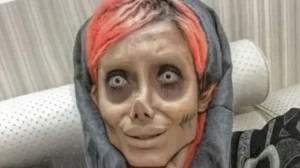The social media influencer known as “Zombie Angelina Jolie” was actually arrested in 2019, years after shocking the world with her eerie online persona.
Sahar Tabar, whose real name is Fatemeh Khishvand, became a viral sensation in 2017 after posting haunting images of herself featuring exaggerated facial features—sunken cheeks, bulging eyes, and a dramatically altered nose. Many believed she had undergone dozens of surgeries to resemble Hollywood star Angelina Jolie.

Her bizarre appearance led to widespread speculation, with media outlets like the BBC reporting concerns about the extreme cosmetic procedures she claimed to have endured. The New York Post even cited her as saying she had 50 surgeries—an attention-grabbing claim that fed public fascination.
However, Sahar later revealed that her shocking look was part of an artistic experiment rather than the result of surgery. In an interview with Sputnik, she admitted that she used makeup and Photoshop to create the illusion, calling it a form of self-expression. “Cyberspace was an easy way,” she said. “It was much easier than becoming an actor.”
Despite the harmless intent behind her posts, Sahar’s online fame came at a high cost. In October 2019, at just 19 years old, she was arrested by Iranian authorities during a crackdown on social media influencers. According to Iran’s Tasnim News Agency, she faced serious charges including blasphemy, inciting violence, encouraging corruption among youth, and violating the country’s dress code. Her Instagram account was swiftly removed following her arrest.

The case drew international attention and sparked criticism online. One tweet at the time sarcastically remarked that she should have pursued “less controversial” acts like embezzlement or murder.
In December 2020, Sahar was sentenced to 10 years in prison for “corrupting the youth and disrespecting the Islamic Republic,” as reported by The Guardian. However, she did not serve the full sentence.
Following widespread outrage and what activist Masih Alinejad described as intense media pressure, Sahar was released after serving just 15 months. Alinejad tweeted about her release, emphasizing the power of global support in securing her freedom.
Sahar’s lawyer, Saied Dehgan, confirmed her release to The Sun. He also revealed that she had contracted COVID-19 while in prison, which prompted efforts to seek her early release, as noted by BBC News.

Shortly after gaining her freedom, Sahar made an appearance on Iranian state TV channel Rokna. Viewers were stunned to see her real face—vastly different from the ghostly online persona that had made her infamous.
The broadcast reignited conversations on social media. “Wow! It’s so sad what lengths people will go to for fame…” one user commented. Another added, “It’s amazing how people judge others for doing what makes them feel confident.”
